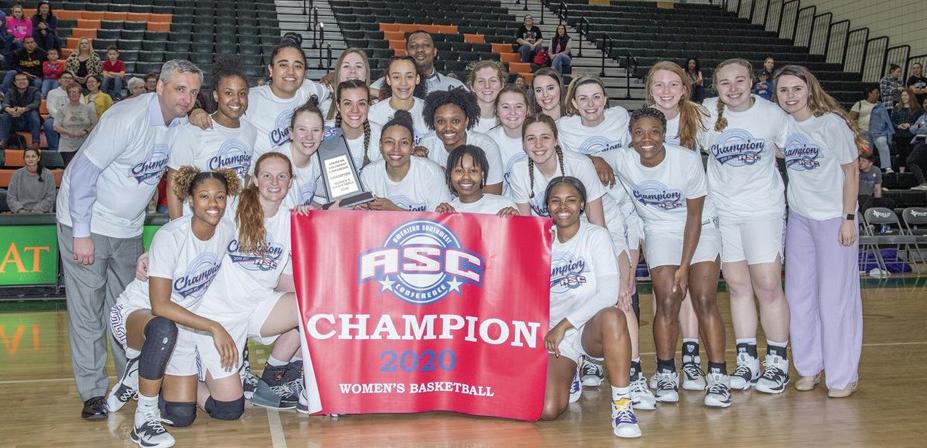
12 minute read
FEATURES
GOING THE DISTANCE
University community moves swiftly to shift classes online when COVID-19 forces students to shelter at home.
BY CHRISTI MAYS
Rebekah Proctor spent her entire four years at UMHB trying to avoid taking online classes. But thanks to the coronavirus, the senior interOn March 23, all UMHB instruction shifted to online learning for the remainder of the semester. UMHB had let out for Spring Break just two weeks prior when it national business major found herself doing exactly that became swiftly evident that the virus was spreading rapin the last six weeks of her college career. idly in the United States and that schools and businesses
“From K through 12, I was home schooled, so doing would have to close. homework on the computer and Dr. Susan Wegmann, associate dean by myself is something I’ve done frequently,” she said. “I tried ”We haven’t been of digital learning and innovation, was in Florida for Spring Break when she to avoid online classes because preparing for this received the call from Dr. John Vassar, college gave me an opportunity to really experience the social inmoment for a provost and senior vice president for academic affairs, who was in Chicago. teractions of a classroom. I loved getting to know my professors few days; we’ve “We knew from the news that something was happening, and we and learning in groups with my been preparing for needed to get our ducks in a row,” classmates.” Sitting with her laptop in her years.” Wegmann said. Both were flying back to Texas on Saturday, and within an parent’s home in Fairfield, Texas, — hour of getting home, Wegmann was she lamented that she wasn’t Dr. John Vassar already back on campus working on a going to finish off her UMHB Provost and Senior Vice President plan. experience with her friends from for Academic Affairs “We decided that Dr. Wegmann and the last four years or experience her team would put together a plan to senior traditions such as the candle-lighting ceremony rapidly train faculty for online instruction,” Vassar said. and graduation. Her study abroad trips to Peru and SingaThe decision was made to extend Spring Break for pore also were canceled. students for an extra week to formulate and execute
Even though the semester didn’t end the way she ena plan: to train over 400 faculty members and adjunct visioned—and knowing many other fellow students were teachers how to move their 1,077 classes online. feeling just as melancholy about the situation COVID-19 The next day, Wegmann and her team of instructional created around the world—she continued to cheer on designers went to work, along with administrators, deans, her fellow students from afar through her Facebook and the Information Technology team. posts: “We can do this! We can get through this time toOn Monday morning, the team of five instructional gether! We can make this time less gloomy than it needs designers started training sessions to show faculty how to be by rallying together.” to create an online curriculum and teach solely through
Dr. Matthew Rupe and Dr. Susan Wegmann, (right), help adjunct faculty member Sylvia White set up her online classes.
technology. “We basically taught them how to become online instructors overnight,” Wegmann said, explaining that typically the process of rewriting a face-to-face classroom curriculum takes an entire semester to set up. UMHB instructors had five days.
Fortunately, Wegmann and her team had been keeping an eye on the situation with the virus prior to Spring Break and began having preliminary conversations about possibly having to move classes online. Vassar said UMHB was also fortunate to have the infrastructure in place to allow for the transition to online instruction.
“We haven’t been preparing for this moment for a few days; we’ve been preparing for years,” Vassar said, explaining that his predecessor, Dr. Steve Oldham, started what is now the Center for Digital Learning in 2015. The CDL has worked with faculty, training them to set up their classes in the Canvas Learning Management System, which creates an “online shell” for every face-toface course. “The decision of the university to invest in online learning was prescient and has helped us in this transition tremendously,” Vassar said.
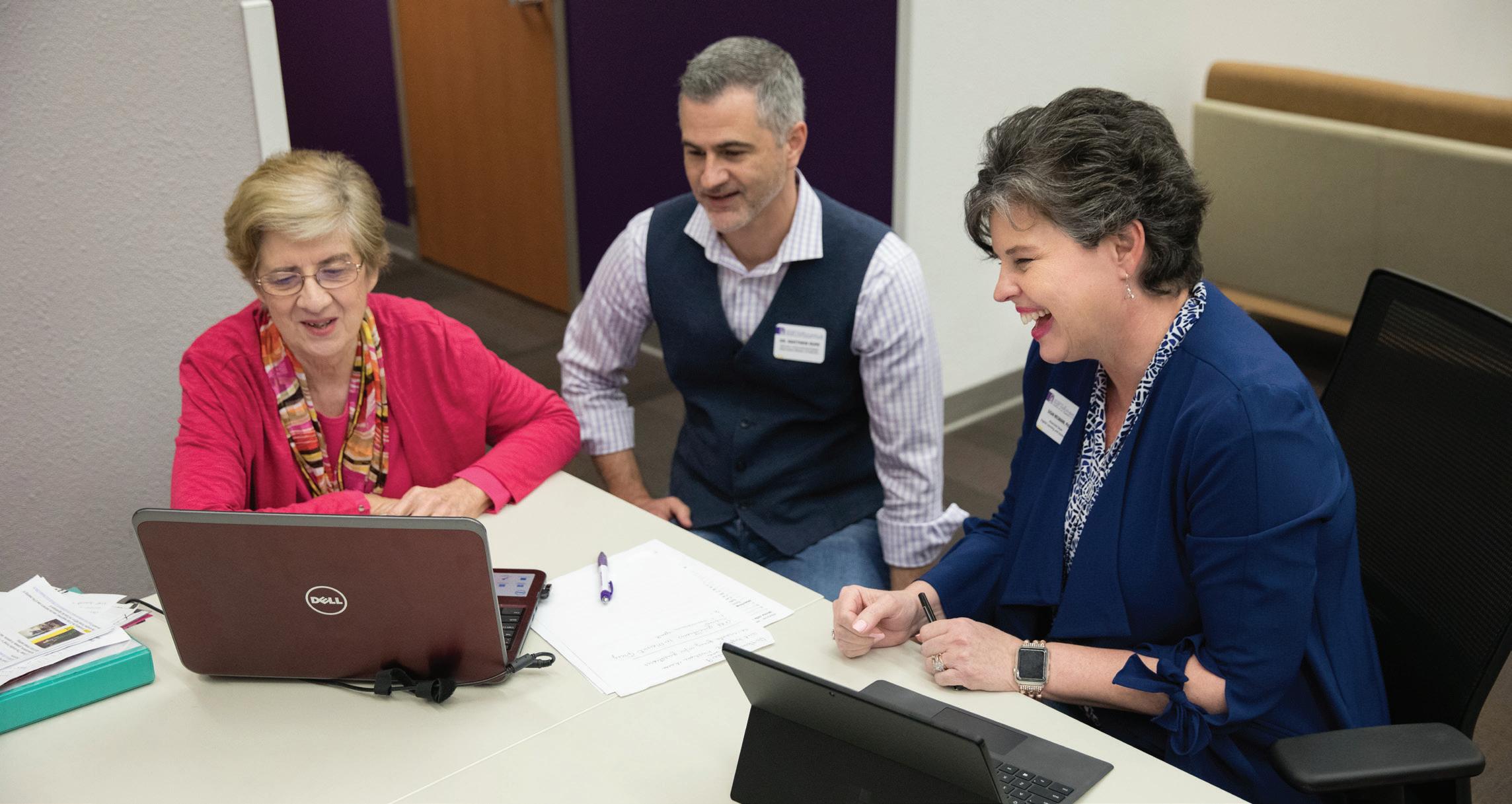
When the process of training faculty to move their courses online began, Wegmann said her first message to them was, “‘We’re not going to give you anything new to use; you’re just going to use what you have.’ I told them it was going to be different, but not hugely insurmountable.”
Wegmann, who has written graduate and undergraduate courses and taught online classes for more than 20 years, decided early on that the most crucial way she could help faculty was to provide structure, but within the structure, allow them freedom.
Many of the faculty, who had never created online courses, realized the intense amount of work involved in being an online professor; however, Wegmann said the overall tone of the faculty remained positive throughout that week.
Dr. Patrick Jaska, a professor of business systems in the McLane College of Business, said the transition has “given him a new perspective on teaching online.”
“I have enjoyed it in some respects, but I would rather be teaching face-to-face,” said Jaska, who, along with all other professors, is working from home due to the “Stay Home, Stay Safe” directive from county officials.
His students seem to be doing well, for the most part, he said. He, on the other hand, has his work station set up a little too close to the kitchen. “I bet I have gained 10 pounds!” he laughed.
Krystal Rangel and Ashley Guthrie from Housekeeping patrol campus daily to make sure everything is germ-free.
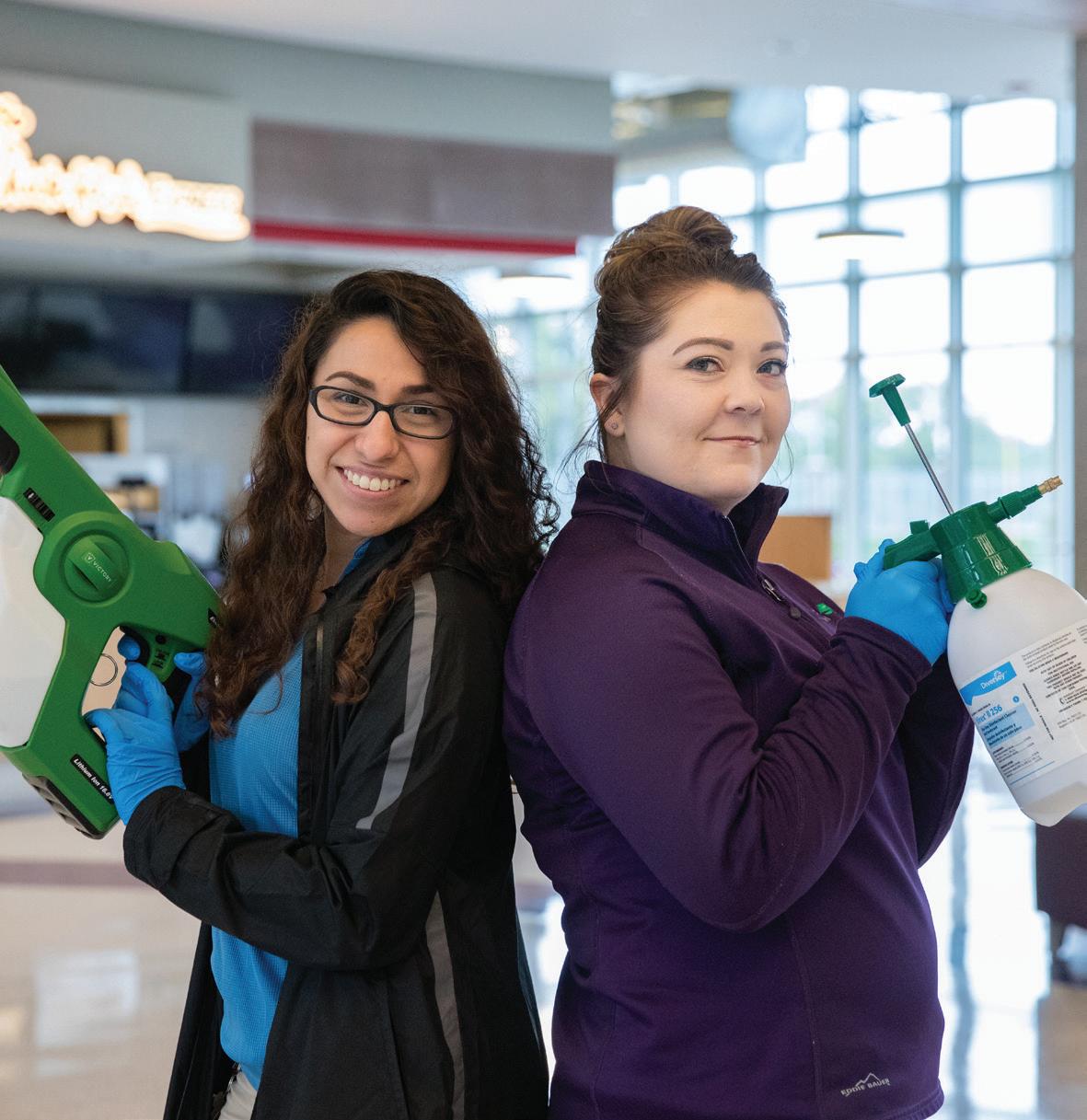
To help lighten the stress during the first few weeks of online learning, Wegmann encouraged professors, who were working from home, to post funny pictures of their pets trying to help them teach or of the creative workstations they have set up.
Dr. Amy Mersiovsky, an assistant professor of nursing, broadcasted a live Zoom meeting to her students from her rabbit barn where she raises show rabbits.
“We joked that it was ‘Dr. M. live from the bunny barn!’” she said.
Mersiovsky, who describes herself as a “calm person,” has tried to keep her online courses relaxed throughout this stressful situation.
She also had to be inventive. Realizing early in the week that she was no longer able to take her Health Care Delivery 2 students to the simulation hospital to review abdominal assessments, procedures, and tubes, she came up with a low-tech improvisation.
Years ago, on a Facebook ad, she had seen an apron depicting the chest cavity and abdominal organs sewed on with various-colored fabrics.
“When I began to plan what I could do to still teach
CRUcial Steps
Many other departments and staff members helped in the transition to online learning: • The music department purchased at least 10 electronic keyboards to send home with students in piano classes who didn’t have pianos at home to practice.
• Information Technology worked to get students laptops if they didn’t have them at home.
• Librarians worked hard to keep the library open to ensure access to computers for students who didn’t have them.
• The Campus Store worked with textbook publishing companies to put their textbooks online for free for the rest of the semester.
• Staff members called students regularly to check on them. The goal was to call each student at least once a week to ensure they were doing well.
• Essential staff members also continued to provide support on campus. Groups who remained on campus performing work that could not shift to a remote mode included Information Technology, Campus Police, Mail Services, Resident Directors, and the Physical Plant staff. To keep the campus safe for essential workers, the Housekeeping staff assigned special crews to disinfect campus buildings daily (above), and hand sanitizing stations were set up at the entrances to all campus bulidings.
my students in a visual manner that was accurate, I remembered the apron was in my office. So I affixed it to a poster board, and I conducted the review!”
For student Garrett Wainwright, switching to online classes came with a little bit of a learning curve. Without the built-in structure of scheduled face-to-face classes, he found it challenging to maintain motivation to get schoolwork done early.
“I dislike change, especially when it happens fast,” said the sophomore, who is majoring in biology prehealth professions. He was one of only 154 students who opted to stay on campus during the pandemic.
For doctoral student Dottie Jones ‘88, these months have not been so quiet. In addition to keeping up with her online classes, the nurse practitioner has been on the front line fighting COVID-19.
Dottie, who is currently working to complete her EdD degree, said 30 years in the medical field had not prepared her for what she has had to face in the last few months.
“I have realized that my time at UMHB has done more than just prepare me for a career with simple knowledge and skills,” she said. “Education and faith go hand-in-hand at UMHB. I’m thankful that I have not only received a valuable education but something even more eternal—a body of believers who invested their lives into mine. UMHB nurtured my faith, and my faith is what sustains me now.”
UMHB President Dr. Randy O’Rear said he is inspired by how the UMHB faculty, staff, and students have reacted to the need to move classes online during the pandemic.
“I am so grateful for the work we have accomplished in seeking innovative ways to continue serving our students in the midst of such great disruption,” he said. “Thanks to God’s provision and great teamwork, we will move past our current challenges. I could not be more proud of our faculty, staff, and students. There’s not another campus I would rather be going through this with than our UMHB family.”
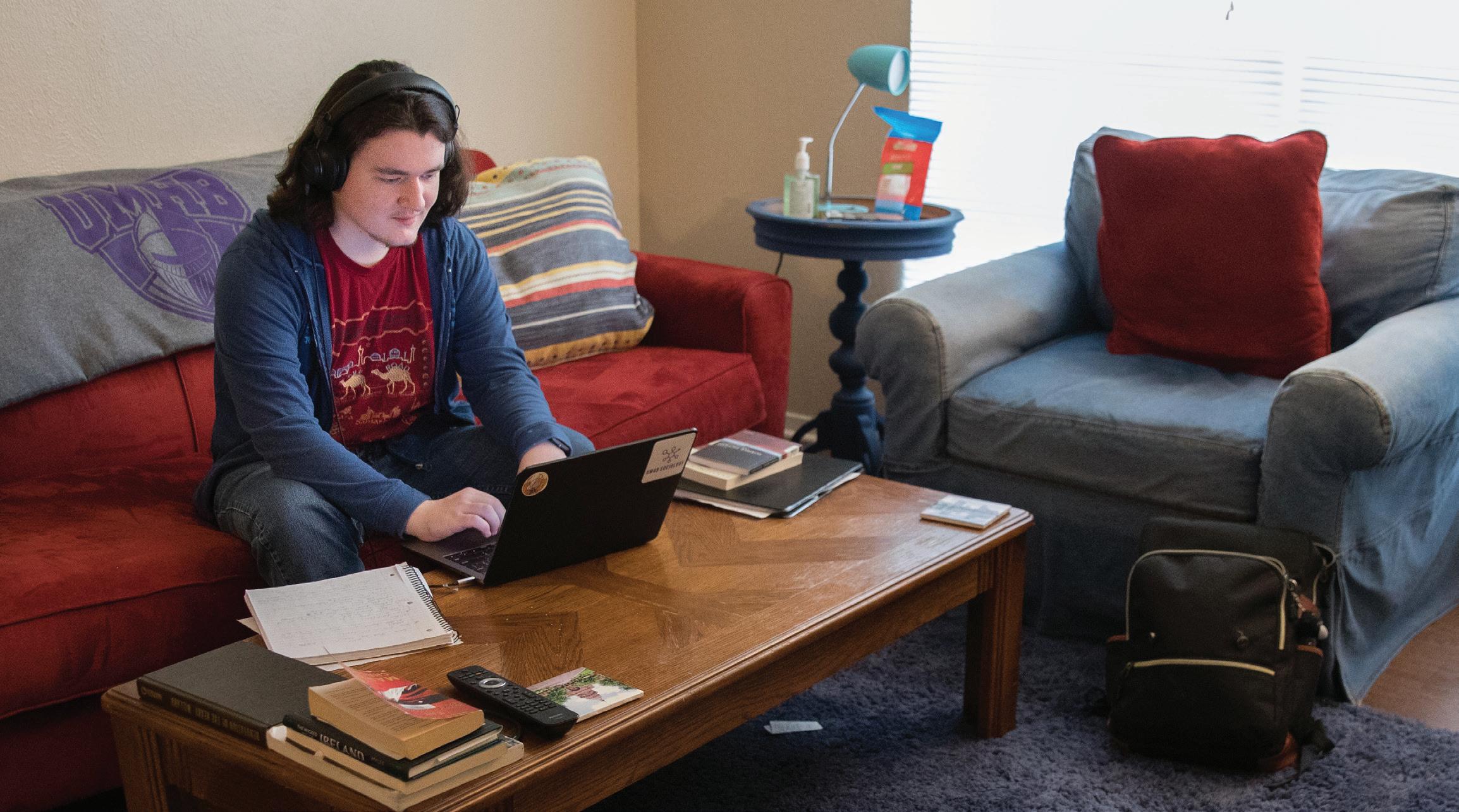
Student Garrett Wainwright works on his classes online in his campus apartment.
As the May 9 date for Spring Commencement drew near, it became clear that the “Stay Home, Stay Safe” directive would make it impossible to hold the traditional graduation ceremony in Crusader Stadium as planned. Knowing that the graduates would be disappointed to have this milestone event postponed, President O’Rear wanted to do something special for the new graduates, to congratulate them, encourage them, and recognize their achievements. O’Rear delived an encouraging and inspirational message to the graduating class as a video message that was sent to each of the graduates on May 8. His message was as follows.
Congratulations, Class of 2020!
I wanted to reach out to you to let you know how proud Julie and I and the faculty and staff are of you as you have completed your studies at UMHB.
This isn’t the way I hoped that I would be speaking to you. My desire was to have you and your family and friends that have supported you on this journey gathered together in Crusader Stadium to celebrate your accomplishments. Even though we couldn’t be physically together, your university family didn’t want to miss an opportunity to say congratulations!
This Spring semester was unprecedented. We’ve never seen anything like this in our lifetime. Your UMHB family watched with pride as you persevered, adapted to change, and demonstrated amazing strength. Who would have known that in your final semester you were going to receive the ultimate test – a test that proved you can handle the challenges and unpredictability of life?
I shouldn’t be surprised by how well your class handled the major disruption this Spring. When many of you arrived on campus as freshmen, you had to be flexible from day one as you were faced with one of the rainiest and most disruptive move-in days in UMHB history. I’m sure you remember that too. I find it interesting that your time at UMHB began with you having to weather a great storm and ended with you overcoming
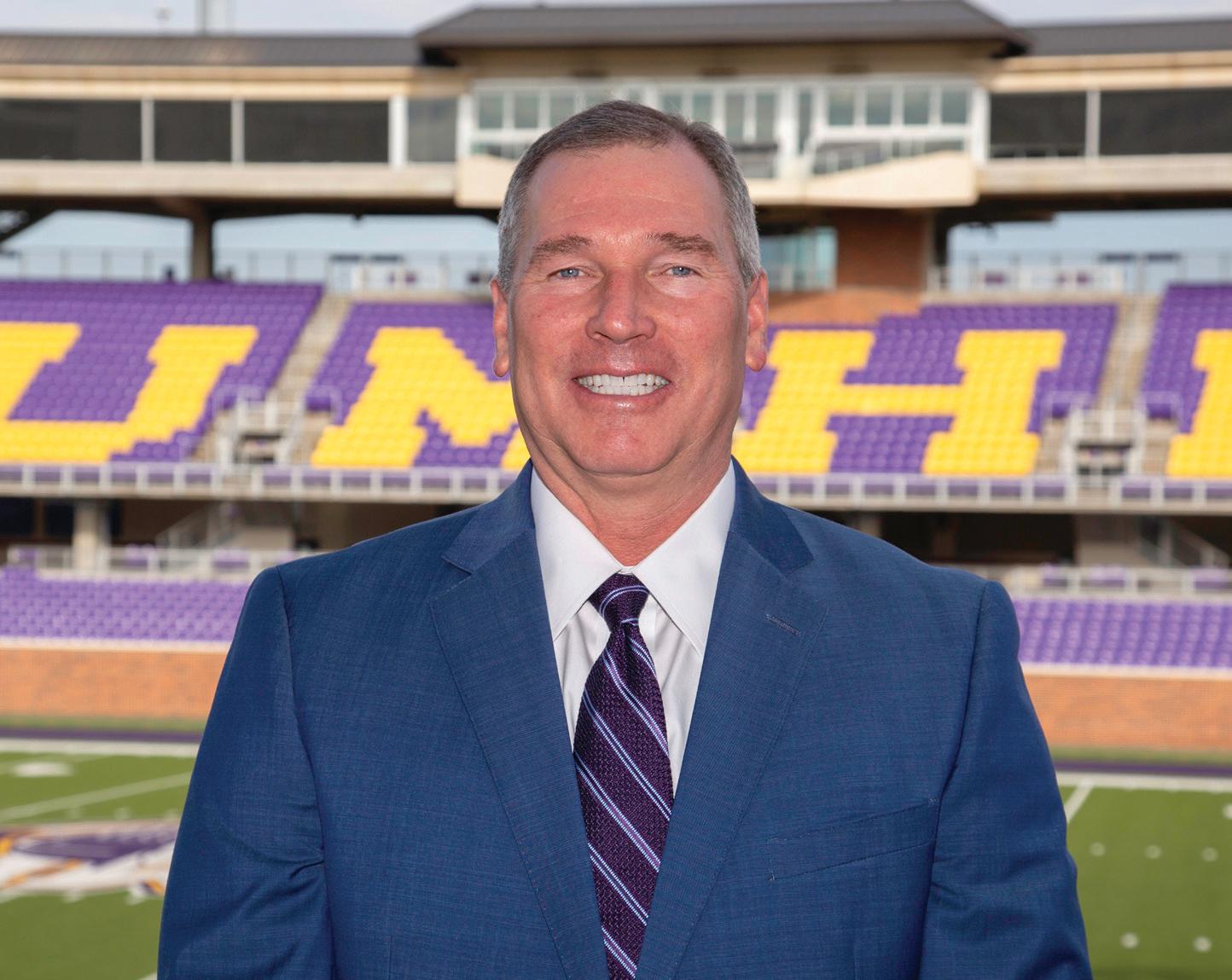
the challenges of a pandemic. Clearly, God has big plans for you.
The challenges this semester presented to our undergraduate students extends to our graduate students as well. You chose to continue your education knowing the sacrifice and time required to earn your degree. Many of you have continued to work full-time jobs and raise families in the midst of rigorous graduate studies. I know none of you anticipated the added challenges this semester would bring, but you persisted and finished strong. Your UMHB family is proud of your accomplishments, and I am confident your hard work and dedication will pay off.
Class of 2020, as you now begin your careers or graduate studies, use what you have learned, not only through this spring semester but over your time at UMHB to show this world your toughness and determination.
Julie and I and your UMHB family commend you for all of your hard work and dedication. We couldn’t be more proud of you. May God Bless you and keep you safe and well. You are now part of the alumni family, so please come back and visit us soon. Go Cru!
Dr. Randy O’Rear speaks to graduates from a silent Crusader Stadium on May 8.

